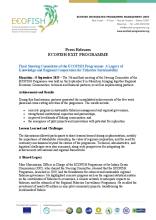ECOFISH EXIT PROGRAMME
Final Steering Committee of the ECOFISH Programme: A Legacy of Knowledge and Regional Cooperation for Fisheries Sustainability
Mauritius – 8 September 2025 – The 7th and final meeting of the Steering Committee of the ECOFISH Programme was held on the September 8 in Mauritius, bringing together Regional Economic Communities, technical and financial partners, as well as implementing partners.
Achievements and Results
During this final session, partners presented the consolidated achievements of the five work plans and cross-cutting activities of the programme. The results include:
- concrete progress in sustainable fisheries management and regional governance,
- strengthened institutional capacities and partnerships,
- improved livelihoods of fishing communities, and
- the emergence of pilot projects and innovations with potential for replication.
Lessons Learned and Challenges
The discussions allowed participants to share lessons learned during implementation, notably the importance of stakeholder ownership, the value of regional cooperation, and the need for continuity mechanisms beyond the closure of the programme. Technical, administrative, and logistical challenges were also examined, along with perspectives for integrating the achievements into national and regional frameworks.
A Shared Legacy
Marc Maminiaina, Officer in Charge of the ECOFISH Programme at the Indian Ocean Commission (IOC), who chaired the Steering Committee, stressed that the ECOFISH Programme, launched in 2019, laid the foundations for coherent and sustainable regional fisheries governance. He highlighted concrete progress such as the regional statistical system on the contribution of fisheries to economies, a climate network to anticipate impacts on fisheries, and the relaunch of the Regional Fisheries Surveillance Programme. He recalled the investment of nearly €8 million in nine pilot community projects, transforming the livelihoods of fishers.
“The future of fisheries in Africa will not be built by simply adding up isolated initiatives. It requires a shared vision, collective commitment, and concerted governance. ECOFISH is a concrete demonstration of this. At the time of closure, our responsibility is clear: to consolidate the gains, ensure their sustainability, and strengthen their institutional integration. It is up to us to make ECOFISH a catalyst for a coherent, coordinated, and forward-looking fisheries governance system.”
For his part, José Maria Troncoso Perera, Head of Cooperation at the European Union Delegation in Mauritius, the programme’s financial partner, recalled that ECOFISH, financed since 2018, embodies Europe’s commitment to the sustainability of oceans and lakes, combining science, cooperation, and field action. He insisted on the importance of capitalising on results and ensuring sustainability, making sure every euro spent is justified.
“One of the foundations of our collective action is cooperation. Marine resources know no borders and, as we know, fisheries and marine ecosystem management are transnational challenges. Our expectation for this final Steering Committee meeting is to ensure that the results of the ECOFISH Programme have a lasting impact, both environmentally and socio-economically.”
Representatives of AU-IBAR and the Lake Tanganyika Authority respectively praised the work carried out by the programme over recent years.
Next Steps
ECOFISH partners called for a clear roadmap to strengthen regional fisheries governance. They recommended entrusting political coordination to the Regional Economic Communities (RECs), while Regional Fisheries Organisations (RFOs) would focus on technical aspects. Co-management and rights-based reforms must be implemented to empower local actors. An ESA Trust Fund, managed by the RECs, was proposed to ensure sustainable financing. Finally, participants stressed the need to scale up flagship platforms developed by ECOFISH – such as BEFSA, FIMS, and FPT-CP – and to promote flexible, modular, results-oriented programming to maximise impact.
The meeting adopted this series of recommendations and validated the ECOFISH exit strategy, ensuring continuity of results and their integration into national, regional, and continental frameworks.

